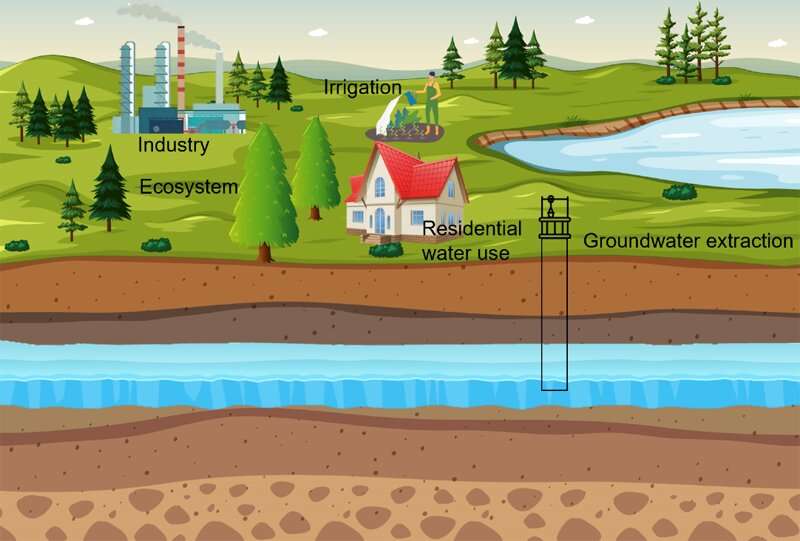Groundwater extraction affects hydrological process over Beijing-Tianjin-Hebei region in Northern China
The rapid development of agriculture and industry in the Beijing-Tianjin-Hebei region leads to an increase in water demand. Excessive groundwater extraction often results in the water depletion that may affect ecological and hydrological processes.
Groundwater depletion can be detected using in-situ observations, gravity recovery and climate experiment data, and simulations.
Recently, a joint research team led by researchers from the Institute of Atmospheric Physics of the Chinese Academy of Sciences investigated the effects of groundwater extraction on hydrological process and energy cycle in Beijing-Tianjin-Hebei by high resolution simulations.
Their study was published in Journal of Hydrology.
“Human groundwater extraction deepened the groundwater table depth between 2000 and 2012 across the plains in front of Taihang Mountain,” said Prof. Jia Binghao, the corresponding author of the study. “Groundwater extraction used for irrigation changed the water and energy budgets, leading to a significant increasing of latent heat flux within the growing season.”
According to this study, groundwater extraction rapidly reduced terrestrial water storage (TWS, exceeding 24 cm per unit area) from 2000 to 2012. TWS changes in 52% of urbanized areas are dominated by groundwater extraction, and 20% of urbanized areas are dominated by evapotranspiration.
“The model in this study can be used for other groundwater extraction hotspots around the world, such as Europe, southern Iran, central United States, northern India, and Pakistan to study the impact of human water use,” said Prof. Xie Zhenghui, one co-author of the study.
Anthropogenic groundwater extraction impacts climate
Longhuan Wang et al, Impact of groundwater extraction on hydrological process over the Beijing-Tianjin-Hebei region, China, Journal of Hydrology (2022). DOI: 10.1016/j.jhydrol.2022.127689
Citation:
Groundwater extraction affects hydrological process over Beijing-Tianjin-Hebei region in Northern China (2022, April 26)
retrieved 2 May 2022
from https://phys.org/news/2022-04-groundwater-affects-hydrological-beijing-tianjin-hebei-region.html
This document is subject to copyright. Apart from any fair dealing for the purpose of private study or research, no
part may be reproduced without the written permission. The content is provided for information purposes only.

The rapid development of agriculture and industry in the Beijing-Tianjin-Hebei region leads to an increase in water demand. Excessive groundwater extraction often results in the water depletion that may affect ecological and hydrological processes.
Groundwater depletion can be detected using in-situ observations, gravity recovery and climate experiment data, and simulations.
Recently, a joint research team led by researchers from the Institute of Atmospheric Physics of the Chinese Academy of Sciences investigated the effects of groundwater extraction on hydrological process and energy cycle in Beijing-Tianjin-Hebei by high resolution simulations.
Their study was published in Journal of Hydrology.
“Human groundwater extraction deepened the groundwater table depth between 2000 and 2012 across the plains in front of Taihang Mountain,” said Prof. Jia Binghao, the corresponding author of the study. “Groundwater extraction used for irrigation changed the water and energy budgets, leading to a significant increasing of latent heat flux within the growing season.”
According to this study, groundwater extraction rapidly reduced terrestrial water storage (TWS, exceeding 24 cm per unit area) from 2000 to 2012. TWS changes in 52% of urbanized areas are dominated by groundwater extraction, and 20% of urbanized areas are dominated by evapotranspiration.
“The model in this study can be used for other groundwater extraction hotspots around the world, such as Europe, southern Iran, central United States, northern India, and Pakistan to study the impact of human water use,” said Prof. Xie Zhenghui, one co-author of the study.
Anthropogenic groundwater extraction impacts climate
Longhuan Wang et al, Impact of groundwater extraction on hydrological process over the Beijing-Tianjin-Hebei region, China, Journal of Hydrology (2022). DOI: 10.1016/j.jhydrol.2022.127689
Citation:
Groundwater extraction affects hydrological process over Beijing-Tianjin-Hebei region in Northern China (2022, April 26)
retrieved 2 May 2022
from https://phys.org/news/2022-04-groundwater-affects-hydrological-beijing-tianjin-hebei-region.html
This document is subject to copyright. Apart from any fair dealing for the purpose of private study or research, no
part may be reproduced without the written permission. The content is provided for information purposes only.
